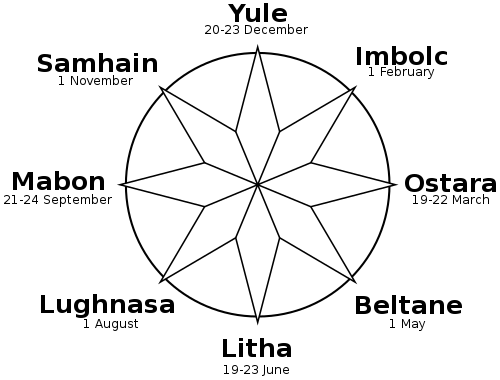In Sweden, only three of those "seasonal festivals" are important. They are Yule ("jul"), the biggest holiday of the year, which we celebrate on December 24, of course. The second most important holiday is probably Easter, but we make less of this holiday than most European countries. (Anyway, the date of Easter can vary by a month, so it should not be counted as a "Wheel of the Year" festival. But the Wheel of the Year festival Ostara must correspond to Easter, of course.)neufer wrote:BMAONE23 wrote:
isn't the end of winter always 6 to 7 weeks after Feb 2?http://en.wikipedia.org/wiki/Groundhog_Day#Alternative_origin_theories wrote:
<<In western countries in the Northern Hemisphere, the official first day of spring is almost seven weeks (46–48 days) after Groundhog Day, on March 20 or March 21. The custom could have been a folk embodiment of the confusion created by the collision of two calendrical systems. Some ancient traditions marked the change of season at cross-quarter days such as Imbolc when daylight first makes significant progress against the night. Other traditions held that spring did not begin until the length of daylight overtook night at the Vernal Equinox. So an arbiter, the groundhog/hedgehog, was incorporated as a yearly custom to settle the two traditions. Sometimes spring begins at Imbolc, and sometimes
winter lasts six more weeks until the equinox.>>
No, to us the really biggest non-Yule festival is Midsummer, although we don't get to stay home from work on that day. That problem has been solved by making sure that we always celebrate it on a Friday and a Saturday.
The only other festival that we observe in any way is Beltane, on May 1. My grandfather, a deeply devout Christian, would often sing out loud a short tune with the lyrics, "Today is the First of May!"It didn't really matter what date it really was, because my grandfather loved to imagine that it was May 1 anyway.
In Sweden we would never celebrate Imbolc. Why should we? We are always looking forward to at least six more weeks of winter on February 2.
We also don't celebrate Lughnasadh. What would be the point? The fact that July is over means that summer is drawing to a close. Why celebrate that?
And Mabon - goodness no, we don't celebrate anything during autumn. Samhain, well - we have recently started remembering our dead ones with a bit more ceremony than we used to, at about the time of Samhain. For a few years we tried to celebrate Halloween. Then people just got tired of it.
In a country with long winters and short summers, we celebrate Yule, Beltane and Midsummer.
Ann
